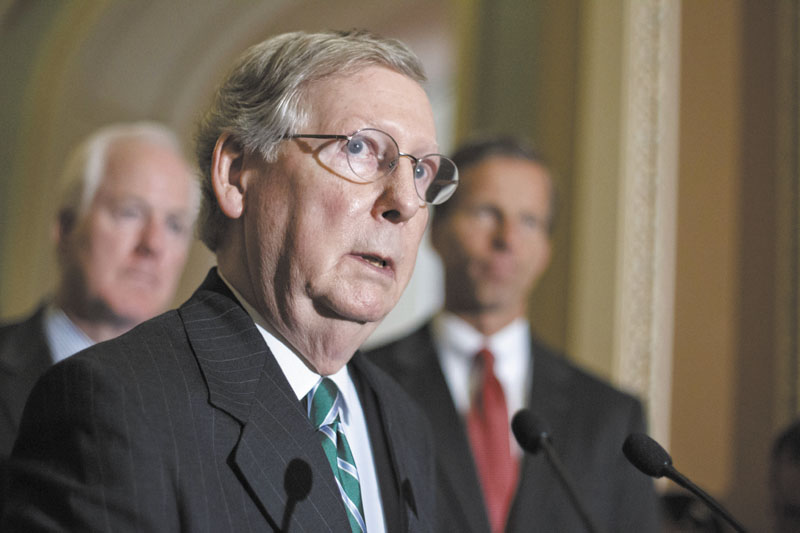The carrot — millions in federal money — remains.
The federal government will pay 100 percent of the expansion between 2014 and 2017, and 90 percent after that. Accepting federal dollars, an estimated $1 trillion, may seem like a no-brainer for the states. However, Maine and other Republican-controlled states face an ideological and political dilemma.
Congressional Republicans have vowed to repeal the law and are urging GOP governors to fight its implementation on the state level. National reports indicate that at least 15 of the country’s 29 GOP governors are leaning toward forgoing Medicaid expansion funding.
To this point, Gov. LePage isn’t among them. The governor doesn’t like the health care law, or Medicaid spending, which he successfully moved to reduce this year. State and federal officials still are reviewing whether the court ruling means that some of the cuts Maine passed this year will still require a waiver from ACA — a waiver that no state has obtained.
Nonetheless, LePage has made no definitive statements about whether he’ll spurn the federal money and fight the Medicaid expansion. He told the Capitol News Service on Tuesday that no decisions would be made until after the election.
“It’s an incredibly complex issue, and we’re still assessing our options at this point,” said Adrienne Bennett, LePage’s spokeswoman. “We’re in the process of analyzing what Medicaid expansion would mean for Maine.”
LePage, who joined a conference call Tuesday with GOP governors to discuss the court ruling, isn’t the only Republican chief executive who is hedging. New Jersey Gov. Chris Christie has been similarly noncommittal, a position that may reflect the fact that New Jersey is one of six states already leading the nation in Medicaid expansion under the health care law.
Maine isn’t quite as far along as New Jersey, but Medicaid eligibility increased when Democrats controlled state government before the 2010 Republican electoral sweep. The policy moves reflected the Democratic belief that Medicaid is an effective health care delivery system for poor Mainers.
The health care law advances that belief. It proposes that Medicaid cover nearly all individuals with incomes up to 133 percent of the federal poverty line. A single person earning up to $14,856 would receive health care coverage, while a family of three earning up to $25,390 would be covered.
Maine Democrats and advocates for the poor say the federally funded Medicaid expansion is a good opportunity for the state. If Maine opts out, they say, taxpayers here would simply be paying for the expansion in other states, with no benefit for needy Mainers.
“I am hopeful” Maine will go along with the expansion, said Sara Gagne Holmes, executive director of Maine Equal Justice Partners, a group that advocates for the poor. “I don’t think this is a party-line issue. I think this is an issue of what makes the most fiscal sense for states to do. It’s an incredible opportunity to cover our most vulnerable people with 100 percent federal dollars for the first two years, and over time it gets no lower that 90 percent.”
The federal investment would save Mainers money because those needy residents no longer would have to get charity care in hospital emergency rooms, she said.
The charity care argument could play a significant role in LePage and the lawmakers’ decision-making, particularly if it’s made by the Maine Hospital Association, the trade group representing the state’s hospitals. Data published by the American Hospital Association shows that uncompensated care — health care costs that hospitals absorb because people either can’t or won’t pay — has soared from less than $5 billion to nearly $40 billion between 1980 and 2010.
A recent report in The Portland Press Herald showed that uncompensated care paid by Maine hospitals has doubled over the last five years, from $94 million to $194 million.
Jeffrey Austin, a spokesman for the Maine Hospital Association, said uncompensated care is a “significant burden, but it’s just not fever-pitch like it is in states” with very low Medicaid eligibility programs.
Austin said that higher Medicaid eligibility would decrease uncompensated care costs. However, he said, hospitals often end up paying for expanded Medicaid programming through reduced federal reimbursements.
“It’s great to have more people covered … but the feds have to get the money for that somewhere, so they’re cutting money for hospital payments,” said Austin, adding that lower hospital payments have produced an aggregate reduction of $900 million over the last 10 years.
Still, Austin said, it was possible that the association would advocate for the expansion.
White House Chief of Staff Jack Lew, in a recent interview on ABC’s “This Week,” said he was confident that most states would increase Medicaid eligibility.
“For those few that are slow to come in, they’re going to have to answer to people why they’re turning this down and why they’re letting people go without coverage,” Lew said.
However, some states are already pushing back on that argument. They say that the federal government will pay administrative costs, but states will absorb the additional technological and administrative expense of the expansion.
State Sen. Richard Rosen, R-Bucksport, said Maine lawmakers should be skeptical of the expansion.
“The budget gyrations that we’ve been through since 2008 are a good example of how unpredictable it can be when you start with what appears to be a partnership (with the federal government) and are later left with requirements of being locked into a program,” he said.
Rosen said that if Medicaid is going to grow, states should have flexibility to spend the money. His comment echoes GOP support for block grant Medicaid funding, a controversial idea that Democrats fiercely oppose.
There are other political factors that cloud the prospect of Medicaid expansion in Maine. Among them: a nationally coordinated effort among Republicans to end Obama’s law and his presidency.
State House Bureau writer John Richardson contributed to this report.
Send questions/comments to the editors.




Success. Please wait for the page to reload. If the page does not reload within 5 seconds, please refresh the page.
Enter your email and password to access comments.
Hi, to comment on stories you must . This profile is in addition to your subscription and website login.
Already have a commenting profile? .
Invalid username/password.
Please check your email to confirm and complete your registration.
Only subscribers are eligible to post comments. Please subscribe or login first for digital access. Here’s why.
Use the form below to reset your password. When you've submitted your account email, we will send an email with a reset code.